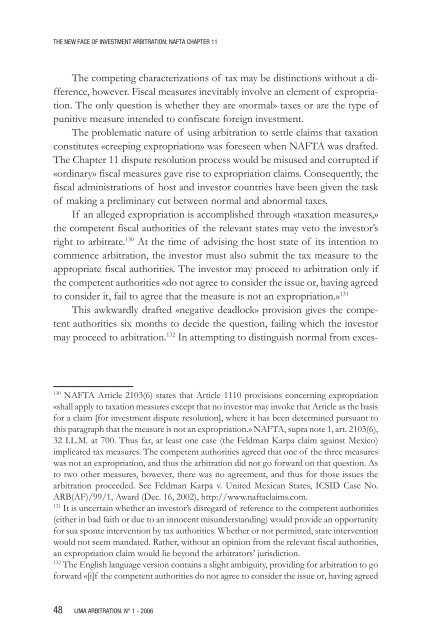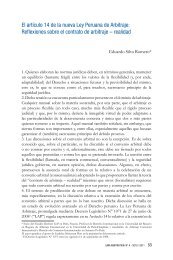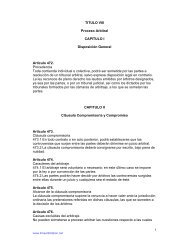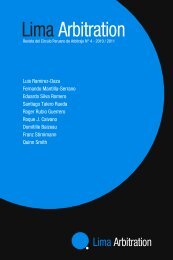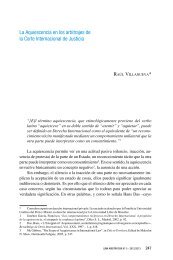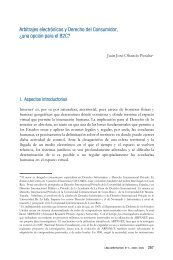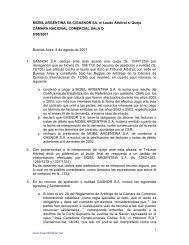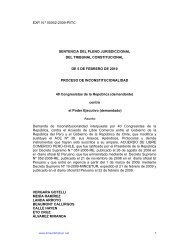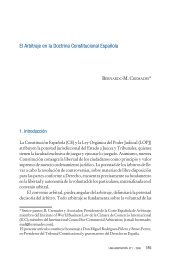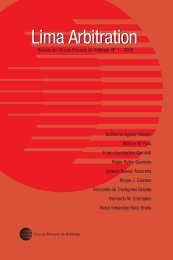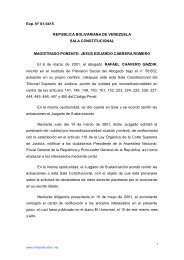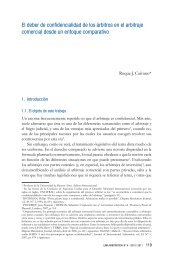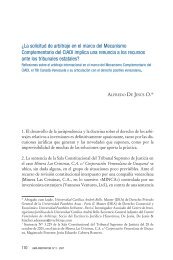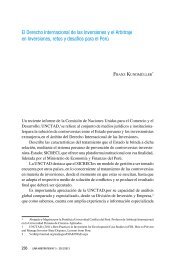Lima Arbitration
Lima Arbitration
Lima Arbitration
You also want an ePaper? Increase the reach of your titles
YUMPU automatically turns print PDFs into web optimized ePapers that Google loves.
THE NEW FACE OF INVESTMENT ARBITRATION: NAFTA CHAPTER 11<br />
The competing characterizations of tax may be distinctions without a difference,<br />
however. Fiscal measures inevitably involve an element of expropriation.<br />
The only question is whether they are «normal» taxes or are the type of<br />
punitive measure intended to confiscate foreign investment.<br />
The problematic nature of using arbitration to settle claims that taxation<br />
constitutes «creeping expropriation» was foreseen when NAFTA was drafted.<br />
The Chapter 11 dispute resolution process would be misused and corrupted if<br />
«ordinary» fiscal measures gave rise to expropriation claims. Consequently, the<br />
fiscal administrations of host and investor countries have been given the task<br />
of making a preliminary cut between normal and abnormal taxes.<br />
If an alleged expropriation is accomplished through «taxation measures,»<br />
the competent fiscal authorities of the relevant states may veto the investor’s<br />
right to arbitrate. 130 At the time of advising the host state of its intention to<br />
commence arbitration, the investor must also submit the tax measure to the<br />
appropriate fiscal authorities. The investor may proceed to arbitration only if<br />
the competent authorities «do not agree to consider the issue or, having agreed<br />
to consider it, fail to agree that the measure is not an expropriation.» 131<br />
This awkwardly drafted «negative deadlock» provision gives the competent<br />
authorities six months to decide the question, failing which the investor<br />
may proceed to arbitration. 132 In attempting to distinguish normal from exces-<br />
130<br />
NAFTA Article 2103(6) states that Article 1110 provisions concerning expropriation<br />
«shall apply to taxation measures except that no investor may invoke that Article as the basis<br />
for a claim [for investment dispute resolution], where it has been determined pursuant to<br />
this paragraph that the measure is not an expropriation.» NAFTA, supra note 1, art. 2103(6),<br />
32 I.L.M. at 700. Thus far, at least one case (the Feldman Karpa claim against Mexico)<br />
implicated tax measures. The competent authorities agreed that one of the three measures<br />
was not an expropriation, and thus the arbitration did not go forward on that question. As<br />
to two other measures, however, there was no agreement, and thus for those issues the<br />
arbitration proceeded. See Feldman Karpa v. United Mexican States, ICSID Case No.<br />
ARB(AF)/99/1, Award (Dec. 16, 2002), http://www.naftaclaims.com.<br />
131<br />
It is uncertain whether an investor’s disregard of reference to the competent authorities<br />
(either in bad faith or due to an innocent misunderstanding) would provide an opportunity<br />
for sua sponte intervention by tax authorities. Whether or not permitted, state intervention<br />
would not seem mandated. Rather, without an opinion from the relevant fiscal authorities,<br />
an expropriation claim would lie beyond the arbitrators’ jurisdiction.<br />
132<br />
The English language version contains a slight ambiguity, providing for arbitration to go<br />
forward «[i]f the competent authorities do not agree to consider the issue or, having agreed<br />
48 LIMA ARBITRATION. N° 1 - 2006


